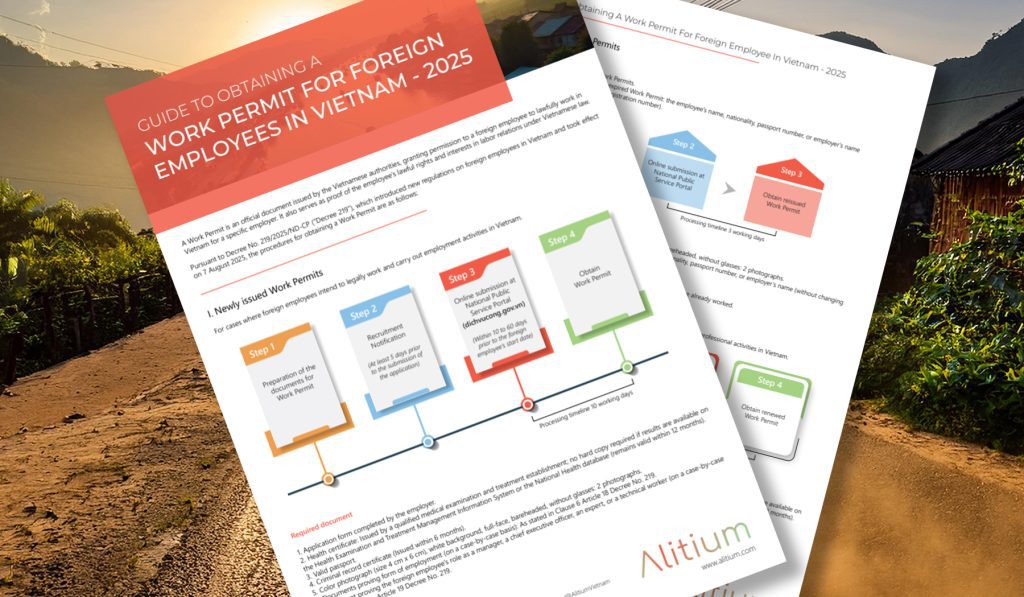Delayed Charter Capital Contributions:
Practical Strategies for Resolution in Vietnam
In Vietnam, the concept of Charter Capital is central to corporate compliance and operations, representing the initial capital investment pledged by founding investors in a Vietnamese company. Despite its importance, misconceptions about Charter Capital being merely procedural can lead to overlooked obligations and significant consequences for failing to meet required contribution deadlines. This article discusses the implications of delayed Charter Capital contributions and provides practical strategies to mitigate and prevent these challenges.
Click here to download this article as PDF: Charter Capital November 2024
1. Charter Capital Contribution Timeframes
Under Vietnam’s Law on Enterprises, investors are required to fulfill their pledged Charter Capital within 90 days of receiving the Enterprise Registration Certificate (ERC). While non-cash contributions, such as physical assets, may have slightly more flexibility to account for logistics and transfer processes, cash contributions are strictly bound to the 90-day window.
Contribution Processes for Foreign and Domestic Investors:
- Foreign Investors: Must contribute their capital through a specifically designated bank account: through a Direct Investment Capital Account (DICA) for companies with at least 51% foreign ownership or an Investment Registration Certificate (IRC), or otherwise through an Indirect Investment Capital Account (IICA). Failing to deposit funds through the proper account within the 90-day period can lead to significant compliance issues.
- Domestic Investors: Are not subject to the same specific bank account requirements as foreign investors and can deposit capital into standard company bank accounts, provided the 90-day rule is met.
2. Importance of Capital Contribution and Meeting Deadlines
Vietnam’s Enterprise and Investment Laws do not specifically set minimum capital contributions for establishing a Vietnamese company (for most industries), however licensing authorities have general expectations that they will enforce for what they believe is sufficient (minimum) capital for the activities that a company seeks to undertake.
The 90-day capital contribution deadline exists for several reasons:
Operational Preparedness: Ensuring companies have adequate capital and funding for initial expenses, license procurement, and establishment activities, and that once established companies have a financial foundation for success.
Credibility: Underpins the credibility of a company (particularly newly established entities), as it demonstrates to banks, suppliers, government authorities, partners and employees that it has sufficient financial access for the business it is to undertake, and
Governance: The contribution of capital within deadlines reinforces investors commitments to Vietnam and the specific entity.
3. Consequences of Delayed Contributions
Failure to meet capital contribution deadlines can lead to serious financial, operational, and legal consequences for the company. If a company does not meet its capital contribution obligations within 90 days, corrective obligations arise and implications for removing non-compliant investors from their ownership registration occur:
For Single-Member LLCs: The owner must register a reduction in contributed capital within 30 days after the deadline if the full amount was not contributed.
For Multi-Member LLCs
- Members who have not contributed any capital will lose their membership status.
- Members with partial contributions retain rights proportional to their actual contributions.
- Unpaid capital shares may be offered for sale as decided by the Board of Members.
- The company must update the Charter Capital and members’ holdings within 30 days after the deadline.
For Joint Stock Companies (JSCs)
- Shareholders who have not paid for their registered shares lose shareholder status and cannot transfer rights to purchase unpaid shares.
- Shareholders with partial contributions retain voting rights, dividends, and other entitlements proportional to their paid shares but cannot transfer rights to unpaid shares.
- Unpaid shares are considered unsold, authorizing the Board of Directors to sell them.
- The company must adjust its Charter Capital to reflect paid shares and register any changes in founding shareholders within 30 days of the deadline.
Note: LLCs in Vietnam do not issue shares like JSCs. In an LLC, equity holders are referred to as “owners” in single-member LLCs and “capital-contributing members” in multi-member LLCs.
Financial Penalties: Companies that fail to update changes to capital or members/shareholders within 30 days from the 90-day deadline may incur fines imposed by regulatory authorities. Specifically, under Article 46, Point 3 of Decree 122/2021/ND-CP, fines between VND 30,000,000 and VND 50,000,000 may be levied.
The implications of missed capital contributions extend further for foreign-invested companies, where stricter regulations apply due to capital injection requirements through designated capital bank accounts. For these companies, missing the 90-day deadline often means banks may refuse to accept capital deposits due to non-compliance with the registered timeline on the Investment Registration Certificate (IRC), depending on their interpretation of State Bank of Vietnam requirements. One remedy is for an amendment to the IRC extending the capital contribution period. This process involves administrative coordination with the Department of Planning and Investment (DPI), with potential fines for failing to follow the approved IRC timeline (from VND70,000,000).
Further Challenges for Single-Member LLCs: Where capital has not been injected by a (foreign) owner, the procedural steps required for foreign-invested single-member LLCs to continue operations may vary depending on differing provincial practices. Some interpretations may necessitate company closure, while others allow for an extended timeline for capital injection through additional regulatory processes. This variability reflects differences in how local offices interpret the Law on Enterprises and Decree 122/2021/ND-CP, introducing potential uncertainties for companies trying to navigate compliance requirements.
4. Strategic Solutions for Managing Delays
For companies that encounter challenges in meeting the 90-day Charter Capital contribution requirement, strategic planning and awareness are vital:
- Understand Local Compliance Requirements: Companies should familiarize themselves with specific expectations of local authorities, especially foreign-invested enterprises, as interpretations and processes can differ.
- Amend the IRC: For foreign-invested companies, requesting an extension by amending the IRC is an effective strategy. This requires coordination with the Department of Planning and Investment (DPI) and may involve detailed administrative work and inspections. Companies should account for potential fees and penalties associated with these amendments.
- Proactive Communication with Banks: Companies should maintain open communication with banking partners to confirm the requirements for capital contributions through capital bank accounts. This is particularly crucial when dealing with foreign investments, as non-compliance can lead to rejected deposits and additional administrative hurdles.
- Leverage Pre-IRC Expenses: Under Vietnamese regulations, certain pre-IRC expenses can be credited toward Charter Capital. Properly documented expenses can demonstrate compliance and reduce the immediate cash burden by converting existing costs into capital.
- Monitor Adjustment Deadlines: Companies should closely monitor deadlines for Charter Capital adjustments to avoid further non-compliance penalties.
- Seek Legal Advice: For complex situations or varied interpretations of laws, professional legal counsel can provide clarity and guidance, ensuring companies understand their obligations and potential remedies.
Charter capital contributions are more than a formality—they are fundamental to a company’s legal compliance, operational capability, and financial stability in Vietnam. Both local and foreign-invested enterprises must prioritize fulfilling these obligations to secure their regulatory standing and maintain credibility. Through strategic planning, proactive communication, and seeking professional guidance when necessary, businesses can navigate potential challenges effectively and safeguard their operations within Vietnam’s regulatory landscape.
Phuong Vo is Managing Partner at Alitium, and brings more than a dozen years of advising and assisting foreign investors enter and remain compliant in Vietnam. Contact Phuong via Alitium.com for further assistance and advice.








